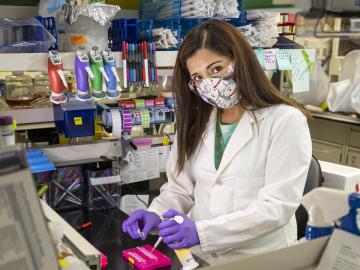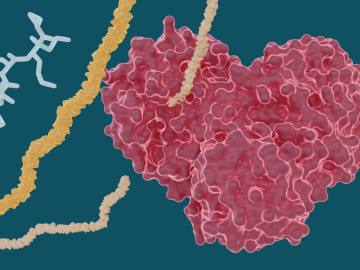
Filter News
Area of Research
- Advanced Manufacturing (2)
- Biological Systems (1)
- Biology and Environment (84)
- Computational Biology (2)
- Computational Engineering (1)
- Energy Science (36)
- Fusion and Fission (5)
- Isotopes (6)
- Materials (50)
- Materials for Computing (8)
- National Security (13)
- Neutron Science (121)
- Nuclear Science and Technology (7)
- Supercomputing (33)
News Topics
- (-) Biology (128)
- (-) Biomedical (73)
- (-) Neutron Science (171)
- (-) Partnerships (68)
- 3-D Printing/Advanced Manufacturing (147)
- Advanced Reactors (40)
- Artificial Intelligence (131)
- Big Data (79)
- Bioenergy (112)
- Biotechnology (39)
- Buildings (74)
- Chemical Sciences (86)
- Clean Water (33)
- Composites (35)
- Computer Science (226)
- Coronavirus (48)
- Critical Materials (29)
- Cybersecurity (35)
- Education (5)
- Element Discovery (1)
- Emergency (4)
- Energy Storage (114)
- Environment (218)
- Exascale Computing (67)
- Fossil Energy (8)
- Frontier (64)
- Fusion (67)
- Grid (74)
- High-Performance Computing (130)
- Hydropower (12)
- Irradiation (3)
- Isotopes (62)
- ITER (9)
- Machine Learning (68)
- Materials (157)
- Materials Science (158)
- Mathematics (12)
- Mercury (12)
- Microelectronics (4)
- Microscopy (56)
- Molten Salt (10)
- Nanotechnology (64)
- National Security (86)
- Nuclear Energy (122)
- Physics (69)
- Polymers (35)
- Quantum Computing (53)
- Quantum Science (93)
- Security (31)
- Simulation (65)
- Software (1)
- Space Exploration (26)
- Statistics (4)
- Summit (71)
- Transportation (103)
Media Contacts

From soda bottles to car bumpers to piping, electronics, and packaging, plastics have become a ubiquitous part of our lives.

Six ORNL scientists have been elected as fellows to the American Association for the Advancement of Science, or AAAS.

The annual Director's Awards recognized four individuals and teams including awards for leadership in quantum simulation development and application on high-performance computing platforms, and revolutionary advancements in the area of microbial

A multi-institutional team, led by a group of investigators at Oak Ridge National Laboratory, has been studying various SARS-CoV-2 protein targets, including the virus’s main protease. The feat has earned the team a finalist nomination for the Association of Computing Machinery, or ACM, Gordon Bell Special Prize for High Performance Computing-Based COVID-19 Research.

Experiments led by researchers at ORNL have determined that several hepatitis C drugs can inhibit the SARS-CoV-2 main protease, a crucial protein enzyme that enables the novel coronavirus to reproduce.

ORNL has added 10 virtual tours to its campus map, each with multiple views to show floor plans, rotating dollhouse views and 360-degree navigation. As a user travels through a map, pop-out informational windows deliver facts, videos, graphics and links to other related content.

NellOne Therapeutics has licensed a drug delivery system from the Department of Energy’s Oak Ridge National Laboratory that is designed to transport therapeutics directly to cells infected by SARS-CoV-2, the virus causing COVID-19.

Scientists from Oak Ridge National Laboratory used high-performance computing to create protein models that helped reveal how the outer membrane is tethered to the cell membrane in certain bacteria.

Pauling’s Rules is the standard model used to describe atomic arrangements in ordered materials. Neutron scattering experiments at Oak Ridge National Laboratory confirmed this approach can also be used to describe highly disordered materials.

When Sandra Davern looks to the future, she sees individualized isotopes sent into the body with a specific target: cancer cells.


